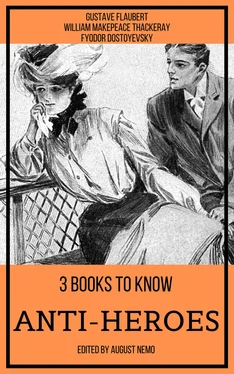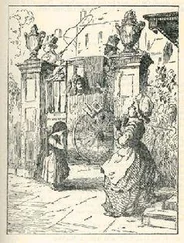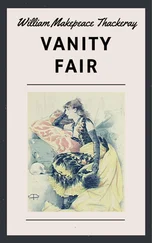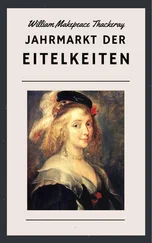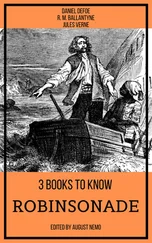It was agreed that I should keep my character of valet; that in the presence of strangers I should not know a word of English; that I should keep a good look-out on the trumps when I was serving the champagne and punch about; and, having a remarkably fine eyesight and a great natural aptitude, I was speedily able to give my dear uncle much assistance against his opponents at the green table. Some prudish persons may affect indignation at the frankness of these confessions, but Heaven pity them! Do you suppose that any man who has lost or won a hundred thousand pounds at play will not take the advantages which his neighbour enjoys? They are all the same. But it is only the clumsy fool who CHEATS; who resorts to the vulgar expedients of cogged dice and cut cards. Such a man is sure to go wrong some time or other, and is not fit to play in the society of gallant gentlemen; and my advice to people who see such a vulgar person at his pranks is, of course, to back him while he plays, but never—never to have anything to do with him. Play grandly, honourably. Be not, of course, cast down at losing; but above all, be not eager at winning, as mean souls are. And, indeed, with all one’s skill and advantages, winning is often problematical; I have seen a sheer ignoramus that knows no more of play than of Hebrew, blunder you out of five thousand pounds in a few turns of the cards. I have seen a gentleman and his confederate play against another and HIS confederate. One never is secure in these cases: and when one considers the time and labour spent, the genius, the anxiety, the outlay of money required, the multiplicity of bad debts that one meets with (for dishonourable rascals are to be found at the play-table, as everywhere else in the world), I say, for my part, the profession is a bad one; and, indeed, have scarcely ever met a man who, in the end, profited by it. I am writing now with the experience of a man of the world. At the time I speak of I was a lad, dazzled by the idea of wealth, and respecting, certainly too much, my uncle’s superior age and station in life.
There is no need to particularise here the little arrangements made between us; the playmen of the present day want no instruction, I take it, and the public have little interest in the matter. But simplicity was our secret. Everything successful is simple. If, for instance, I wiped the dust off a chair with my napkin, it was to show that the enemy was strong in diamonds; if I pushed it, he had ace, king; if I said, ‘Punch or wine, my Lord?’ hearts was meant; if ‘Wine or punch?’ clubs. If I blew my nose, it was to indicate that there was another confederate employed by the adversary; and THEN, I warrant you, some pretty trials of skill would take place. My Lord Deuceace, although so young, had a very great skill and cleverness with the cards in every way; and it was only from hearing Frank Punter, who came with him, yawn three times when the Chevalier had the ace of trumps, that I knew we were Greek to Greek, as it were.
My assumed dulness was perfect; and I used to make Monsieur de Potzdorff laugh with it, when I carried my little reports to him at the Garden-house outside the town where he gave me rendezvous. These reports, of course, were arranged between me and my uncle beforehand. I was instructed (and it is always far the best way) to tell as much truth as my story would possibly bear. When, for instance, he would ask me, ‘What does the Chevalier do of a morning?’
‘He goes to church regularly’ (he was very religious), ‘and after hearing mass comes home to breakfast. Then he takes an airing in his chariot till dinner, which is served at noon. After dinner he writes his letters, if he have any letters to write: but he has very little to do in this way. His letters are to the Austrian envoy, with whom he corresponds, but who does not acknowledge him; and being written in English, of course I look over his shoulder. He generally writes for money. He says he wants it to bribe the secretaries of the Treasury, in order to find out really where the alloyed ducats come from; but, in fact, he wants it to play of evenings, when he makes his party with Calsabigi, the lottery-contractor, the Russian attaches, two from the English embassy, my Lords Deuceace and Punter, who play a jeu d’enfer, and a few more. The same set meet every night at supper: there are seldom any ladies; those who come are chiefly French ladies, members of the corps de ballet. He wins often, but not always. Lord Deuceace is a very fine player. The Chevalier Elliot, the English Minister, sometimes comes, on which occasion the secretaries do not play. Monsieur de Balibari dines at the missions, but en petit comite, not on grand days of reception. Calsabigi, I think, is his confederate at play. He has won lately; but the week before last he pledged his solitaire for four hundred ducats.’
‘Do he and the English attaches talk together in their own language?’
‘Yes; he and the envoy spoke yesterday for half-an-hour about the new danseuse and the American troubles: chiefly about the new danseuse.’
It will be seen that the information I gave was very minute and accurate, though not very important. But such as it was, it was carried to the ears of that famous hero and warrior the Philosopher of Sans Souci; and there was not a stranger who entered the capital but his actions were similarly spied and related to Frederick the Great.
As long as the play was confined to the young men of the different embassies, His Majesty did not care to prevent it; nay, he encouraged play at all the missions, knowing full well that a man in difficulties can be made to speak, and that a timely rouleau of Frederics would often get him a secret worth many thousands. He got some papers from the French house in this way: and I have no doubt that my Lord Deuceace would have supplied him with information at a similar rate, had his chief not known the young nobleman’s character pretty well, and had (as is usually the case) the work of the mission performed by a steady roturier, while the young brilliant bloods of the suite sported their embroidery at the balls, or shook their Mechlin ruffles over the green tables at faro. I have seen many scores of these young sprigs since, of these and their principals, and, mon Dieu! what fools they are! What dullards, what fribbles, what addle-headed simple coxcombs! This is one of the lies of the world, this diplomacy; or how could we suppose, that were the profession as difficult as the solemn red-box and tape-men would have us believe, they would invariably choose for it little pink-faced boys from school, with no other claim than mamma’s title, and able at most to judge of a curricle, a new dance, or a neat boot?
When it became known, however, to the officers of the garrison that there was a faro-table in town, they were wild to be admitted to the sport; and, in spite of my entreaties to the contrary, my uncle was not averse to allow the young gentlemen their fling, and once or twice cleared a handsome sum out of their purses. It was in vain I told him that I must carry the news to my captain, before whom his comrades would not fail to talk, and who would thus know of the intrigue even without my information.
‘Tell him,’ said my uncle.
‘They will send you away,’ said I; ‘then what is to become of me?’
‘Make your mind easy,’ said the latter, with a smile; ‘you shall not be left behind, I warrant you. Go take a last look at your barracks, make your mind easy; say a farewell to your friends in Berlin. The dear souls, how they will weep when they hear you are out of the country; and, as sure as my name is Barry, out of it you shall go!’
‘But how, sir?’ said I.
‘Recollect Mr. Fakenham of Fakenham,’ said he knowingly. ‘’Tis you yourself taught me how. Go get me one of my wigs. Open my despatch-box yonder, where the great secrets of the Austrian Chancery lie; put your hair back off you forehead; clap me on this patch and these moustaches, and now look in the glass!’
Читать дальше
